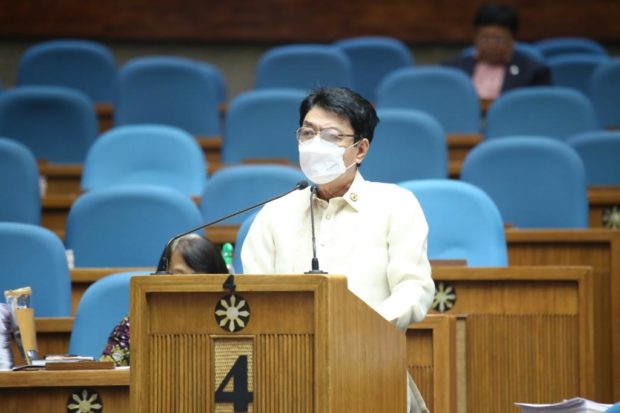Lawmaker says goal of Maharlika fund ‘laudable’ but timing is off

Camarines Sur 3rd District Rep. Gabriel Bordado Jr. delivers his manifestation on the proposed Maharlika Investment Fund (MIF) during the regular plenary session late Tuesday afternoon (December 13, 2022) at the Batasang Pambansa in Quezon City. Bordado says that while sovereign wealth funds such as the MIF could be a good source of additional funds for the country, implementing it while the national debt has ballooned to P13.2 trillion and amid a high debt-to-gross national product ratio is bad timing. Photo from Rep. Bordado’s office
MANILA, Philippines — A lawmaker understands that the Maharlika Investment Fund (MIF) has the potential to influence the future of the country for the better but does not believe that it is the correct time to execute it at this point.
Camarines Sur 3rd District Rep. Gabriel Bordado Jr. said that while the intention of a sovereign wealth fund (SWF) is “very laudable,” it should be “done properly and [at] the right time.”
He noted that the country does not have surplus funds to invest in SWF. He likewise pointed out that the national debt stands at P13.64 trillion, and the national budget is now at a deficit.
“The intention of sovereign wealth funds is very laudable, Mr. Speaker. Its primary functions are first and foremost, to stabilize the country’s economy through diversification and second, to generate wealth for future generations. As the President’s economic team puts it, the Fund can bring both direct and inter-generational benefits,” Bordado said in his manifestation during Tuesday’s plenary session.
“Indeed, Mr. Speaker, putting up a sovereign wealth fund through Maharlika Investment Fund, can be beneficial to the country IF done properly and [at] the right time. We have seen the success of sovereign wealth funds such as the Norwegian Fund, which is now worth $1.2 trillion,” he added.
Article continues after this advertisementBordado also welcomed the removal of the Government Social Insurance System (GSIS) and Social Security System (SSS) from the list of fund sources to come up with the planned P275 billion seed money for the MIF.
Article continues after this advertisementREAD: GSIS and SSS may still invest in Maharlika fund if their boards will allow – lawmaker
To recall, the proposed MIF earned broad backlash as the bill’s original version intended to tap pensioners’ money as part of the venture capital for the MIF. Under House Bill No. 6398, lawmakers planned to raise P275 billion for the MIF which will be derived specifically from the GSIS (P125 billion), SSS (P50 billion), Land Bank of the Philippines (P50 billion), Development Bank of the Philippines (P25 billion) and the General Appropriations Act (P25 billion).
Proponents consequently introduced amendments taking out the GSIS and SSS, and the measure is now known as House Bill No. 6608, which was still drafted by principal authors Speaker Martin Romualdez; Majority Floor Leader and Zamboanga City 2nd District Rep. Manuel Jose Dalipe; Ilocos Norte 1st District Rep. Ferdinand Alexander “Sandro” Marcos; Tingog Party-list Reps. Yedda Marie Romualdez and Jude Acidre; and Marikina 2nd District Rep. Stella Quimbo.
“I put emphasis on without explicit pension liabilities… We cannot put the future of our pensioners in limbo. Allocating billions of pesos of pension funds from both SSS and the GSIS would have been too risky,” Bordado asserted during his manifestation before the House plenary.
President Ferdinand Marcos Jr. had previously said that the proposed law would be good for the country because it would need investment sources to ensure economic growth.
Earlier Wednesday, Speaker Romualdez urged his cousin Marcos to certify as urgent House Bill No. 6608.
But Alliance of Concerned Teachers Party-list Rep. France Castro argued that there is no necessity to certify the bill as urgent because “people who are already deep [in] debt” do not need it. She emphasized that such a measure should also be thoroughly scrutinized since it involves using huge public funds.
Castro further pointed out that several issues regarding the proposal are yet to be addressed.
READ: No urgency to pass Maharlika fund bill: People already in deep debt don’t need it – lawmaker
Among others, the party-list lawmaker inquired if the MIF could be tapped to fund development projects like the Kaliwa dam, which they believe is disadvantageous to the environment and the indigenous peoples.
She also raised the issue on whether the MIF would eventually accept investment money from government-owned or -controlled corporations (GOCCs), including government financial institutions (GFIs), like the GSIS and SSS.
RELATED STORY
MIF ‘beyond repair,’ says nat’l scientist in economics